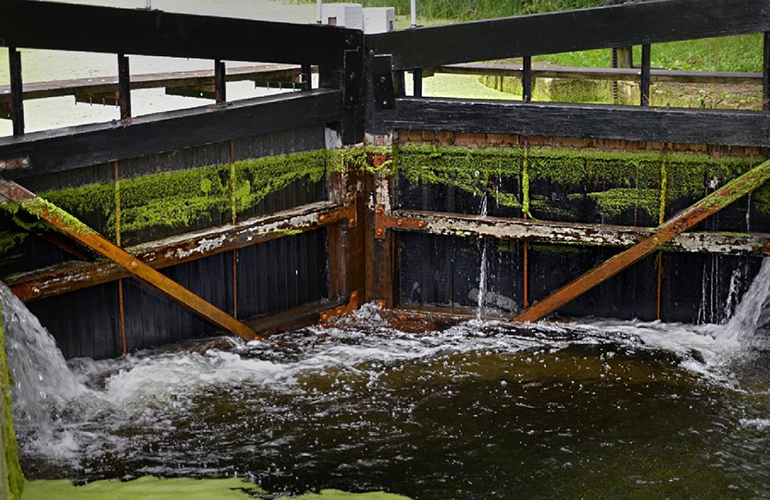
Plaswood Outperforming Timber On Historical Cotswolds Canal

A recent inspection has revealed that Plaswood ‘plastic wood’ lumber is outperforming timber planks at an historical canal lock gate in the Cotswolds.
The top gates of Blunder Lock near Stroud were restored in 2013. Plaswood recycled plastic lumber sections were fitted to the gates at the lock, which had disintegrated over the years and rendered the lock unusable.
After a recent inspection, the top gate fitted with Plaswood lumber sections at Blunder Lock has been found to be performing very well, with excellent implications for future work on the Stroudwater Navigation.
Water leakage is virtually non-existent, and significantly less than that through the timber planks on the other gate of the pair, which were installed at the same time.
Plaswood has a significantly longer life expectancy than timber and it provides long-lasting solutions for boardwalks, jetties, marinas, wetlands, flood barriers, fencing, furniture and structures located in wet, harsh or damp environments.
Blunder Lock is different to all the other locks on the flight in that it is built of stone. Its current name derives from an incident during the canal’s construction when the company engineer caused the original lock to be built at the wrong level having previously been given notice to quit by the company.
Formerly known as Lower Nassfield Lock, this was an original lock of the Stroud water canal designed to cater for Severn trows and was around sixteen-foot-wide and sixty-eight feet long. The lock had a rise of 7 feet 5 inches and was the second to top lock of the five in the Eastington flight, built in 1777.
Unlike the other Stroud water locks, this chamber is mainly lined in ash layered stone, with stone capping and stone quoins to the gate recesses. The mouth and the tail sections are also lined mainly in stone and there are paired vertical sluices on either side of the approach, or mouth, of the lock above the top gates.
The Chief Executive of the Cotswold Canals Trust, Ken Burgin, said:
“Plaswood has some very clear advantages when it comes to longevity and lack of maintenance. We will seriously consider using Plaswood again where appropriate, within the restoration as a whole. The Trust is very pleased with the way that Plaswood has performed. It is doing exactly the job that we hoped it would.”
Mike Baxter, External Affairs Director, Plaswood Group said: “We are delighted to hear that the Plaswood lumber used in the lock gate restoration at Blunder Lock is performing so well versus timber planks. Plaswood has a longer life expectancy than timber and unlike timber it doesn’t degrade with age, which means it offers customers great value for money over a long period of time.”
He continued: “We have manufactured Plaswood for over 30 years and it is fantastic that organisations like the Cotswold Canals Trust are seeing the benefits of our durable, weatherproof products over time.”
Plaswood high performance lumber is made from 100% recycled plastic and offers a no maintenance solution: unlike conventional wooden decking or lumber (aka timber), Plaswood doesn’t require annual maintenance, staining or painting.
It is a sustainable and cost-effective alternative to using traditional materials such as hardwood, concrete and steel.
The Plaswood range is available in brown, jet black and six other colour options. It includes signage, street name plates, signage posts, way marker signage and street and garden furniture such as planters, litter bins, picnic tables, benches, bollards and gates.
The key benefits of using Plaswood are:
- It doesn’t rot or degrade with age.
- It doesn’t require any painting or chemical treatment prior to use or annual maintenance after installation (unlike wood).
- It is tough, durable and strong – Plaswood will not splinter, crack or dry and is resistant to attacks by insects.
- It is more resistant to vandalism like graffiti than alternatives due to its surface.
- It is versatile – Plaswood can easily be designed for use in conjunction with other materials.
Plaswood is becoming increasingly popular with architects, builders’ merchants, civil engineering and construction contractors, local authority specifiers and buyers plus waterways management professionals.
For more information about all Plaswood products including detailed datasheets about each product range visit www.plaswoodgroup.com or call 0333 202 6800.

